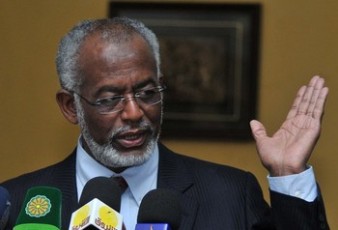Sudan FM accuses some NCP figures of undermining country’s policy in Africa
March 23, 2013 (KHARTOUM) – The Sudanese foreign minister Ali Karti criticized unspecified parties within the ruling National Congress Party (NCP) and accused them of sabotaging Khartoum’s strategy to strengthen ties with Africa.

The Sudanese top diplomat said that African nations protected his country from the International Criminal Court (ICC) and kept its dispute with South Sudan on post-referendum issues away from “internationalization”.
He appealed for more time so that Sudan’s Africa strategy bears fruit.
“[W]e need at least three years to consolidate our strategy towards Africa. When the strategy is implemented then any dissonance [from NCP figures] won’t have a negative impact on our policies. Ill-informed discourse hurts our work. As a responsible state we must rationalize and adjust our discourse and link it to stable strategies,” Karti said.
Karti went on to say that some NCP parties are still embracing “policies and ideas of the nineties” of when the Sudanese regime came to power through an Islamist-backed coup.
“Some circles want to divest us of our friends by antagonizing our neighbors and destroying our leading role in Africa. These circles use some extremists in the NCP to achieve its goals” the Sudanese foreign minister said.
“I have no doubts that those who intend to hinder Sudan’s advancement would use all means including extremists from our ranks” he added.
The minister then tackled the issue of negotiations with Sudan People Liberation Movement North (SPLM-N) who are engaged in battles with Khartoum in Blue Nile and South Kordofan.
Sudan has been strongly resisting regional and international pressure to negotiate with SPLM-N rebels, calling its leaders outlaws and issuing arrest warrants for them.
Officials in Khartoum say they fear being forced to sign a power and wealth sharing arrangements similar to the ones sound with South Sudan’s SPLM in 2005.
The SPLM-N fought alongside the South during its protracted civil war with the north, with conflict flaring in 2011 between Khartoum and rebels fighting for the removal of the Arab-dominated regime.
South Sudan armed and trained SPLM-N when it was part of the South’s rebel force, but maintains it cut all military ties before its independence in July 2011.
The United Nations Security Council (UNSC) resolution issued in May 2012 ordered Sudan and the SPLM-N to cooperate in order to end the conflict in the two regions.
Under the resolution, the two parties are supposed to negotiate on the basis of the 28 June 2011 agreement they signed in Addis Ababa before it was scrapped by Sudanese president Omer Hassan Al-Bashir.
“To my knowledge, the [NCP] supreme Bureau did not refuse to negotiate with the SPLM-N; rather, it refused the framework agreement between the government and the SPLM-North, better known as Nafie-Agar agreement. It was a refusal of specific agreement not the principle of negotiations” Karti said.
“Nafie-Agar agreement is not a revelation from heaven. We did not refuse it totally, some of its provisions could be reviewed and if the other party refuses revisions, it means they are intransigent” he added.
This week the Sudanese defence minister Abdel-Rahim Mohamed Hussein said Khartoum that it is “ready to negotiate with the SPLM-N” but only based on the 2005 Comprehensive Peace Agreement (CPA).
(ST)
